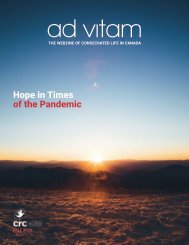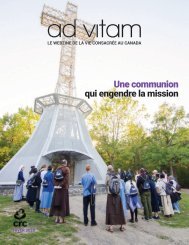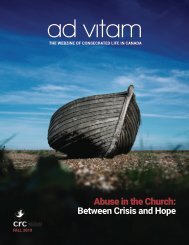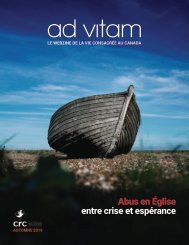ad vitam - Winter 2020
READING TIPS The ad vitam webzine is unique in its offer of an integral and interactive experience featuring articles and audio-visual content. We strongly suggest that you read it online, ideally on a computer or tablet (not recommended on a smartphone). To zoom in: on a computer, double-click or use the + and - found at the bottom-right of the screen; on a tablet, double-tap the screen. Use your mouse or finger to move throughout the page. It is possible to download a PDF of the webzine, however the file will not support links and audio-visual content. For environmental reasons, we invite you to limit printing of the PDF. You may contact us if you wish to obtain a text-only version of a specific article. We hope that as you acquaint yourself with our webzine over time, you’ll enjoy the enriching experience of its unique format. We welcome your comments and questions at info@crc-canada.org.
READING TIPS
The ad vitam webzine is unique in its offer of an integral and interactive experience featuring articles and audio-visual content. We strongly suggest that you read it online, ideally on a computer or tablet (not recommended on a smartphone). To zoom in: on a computer, double-click or use the + and - found at the bottom-right of the screen; on a tablet, double-tap the screen. Use your mouse or finger to move throughout the page.
It is possible to download a PDF of the webzine, however the file will not support links and audio-visual content. For environmental reasons, we invite you to limit printing of the PDF. You may contact us if you wish to obtain a text-only version of a specific article. We hope that as you acquaint yourself with our webzine over time, you’ll enjoy the enriching experience of its unique format. We welcome your comments and questions at info@crc-canada.org.
Create successful ePaper yourself
Turn your PDF publications into a flip-book with our unique Google optimized e-Paper software.
I would now like to speak of vocation in the strict sense, as a<br />
call to missionary service to others. The Lord calls us to share<br />
in his work of creation and to contribute to the common good<br />
by using the gifts we have received. This missionary vocation<br />
thus has to do with service. For our life on earth reaches full<br />
stature when it becomes an offering. Here I would repeat that<br />
“the mission of being in the heart of the people is not just a<br />
part of my life or a b<strong>ad</strong>ge I can take off; it is not an ‘extra’ or<br />
just another moment in life. Inste<strong>ad</strong>, it is something I cannot<br />
uproot from my being without destroying my very self. I am<br />
a mission on this earth; that is the reason why I am here in<br />
this world”. It follows that every form of pastoral activity,<br />
formation and spirituality should be seen in the light of our<br />
Christian vocation.<br />
Post-synodal Apostolic Exhortation Christus vivit, nos. 253-254.<br />
Through these lines, the author of John’s first<br />
letter suggests that missionary activity is a process<br />
that seeks to bring about communion. To<br />
put it another way, the call of our baptism to be<br />
a disciple-missionary is basically an invitation<br />
to put our lives at the service of communion.<br />
People who are “experts in communion”<br />
A few years ago, Pope John Paul II proposed an<br />
expression about communion that was astonishing<br />
to say the least. In his apostolic exhortation<br />
Vita consecrata (VC), he wrote: “Consecrated<br />
persons are asked to be true experts of<br />
communion and to practise the spirituality of<br />
communion …” (VC 46). The qualifier “experts”<br />
used by the pope has something to make the<br />
principal interested persons smile! Indeed,<br />
one does not need to have a long experience<br />
of consecrated life to know that communion<br />
requires constant updating! In this case, then,<br />
would this be a rhetorical exaggeration?<br />
The gift of communion<br />
Beyond the—evolving—quality of our individual<br />
persons and our congregations, it is useful to<br />
remember that communion is first and foremost<br />
a gift. It is, more precisely, a Trinitarian<br />
gift. Indeed, in <strong>ad</strong>dition to the grace of having<br />
“been created in the image of that divine communion”<br />
(Evangelii Gaudium 178), it was given<br />
us, by baptism, to be introduced into this life<br />
of communion which is that of the Father, the<br />
Son and the Holy Spirit. This is what Saint Paul<br />
reminds us of, in the form of a wish, at the end<br />
of his second letter to the Corinthians: “The<br />
grace of the Lord Jesus Christ, the love of God<br />
AD VITAM • WINTER <strong>2020</strong> • 9










